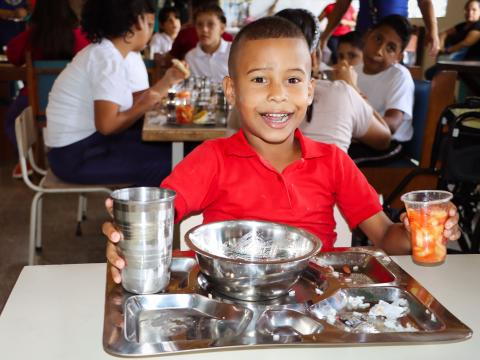New Global Report Confirms School Meals as a Proven Path to Progress

Press Statement
London/Geneva, 10 September 2025
The newly released State of School Feeding Worldwide 2024 Report, by World Food Programme (WFP), carries both hope and urgency. It shows that 466 million children are now receiving school meals through government-led programmes, an increase of 80 million since 2020. This is a significant milestone in global school feeding efforts, but also highlights a stark equity gap: an estimated half of the primary school-aged children remains unreached, with coverage in low-income countries standing at just 27%, compared to 80% in high-income countries.
The release comes ahead of the School Meals Coalition Summit in Fortaleza, Brazil (18–19 September), where policymakers, donors, and implementers will convene to accelerate action. The evidence is clear: school meals are not only a lifeline for children’s health and education, but also a high-return investment in human capital and national development.
World Vision is committed to continuing this work, in partnership with WFP and the School Meals Coalition, until no child is left behind. We work to advance school meals in fragile contexts, as well as through kitchen gardens and other activities in child sponsorship Area Programmes. In FY24, nearly 1 million children, across 20 countries and seven regions, were provided with school meals. Of these, more than 70% were humanitarian settings linked to either a complex emergency or a natural hazard, where World Vision is reaching approximately 740,000 children.
“School meals are a powerful tool for building resilience across multiple dimensions. They support children’s learning, create local employment, offer safe spaces for vulnerable children, and ease the financial pressure on families facing poverty,” says Amanda Rives, Senior Director for Humanitarian Policy, Advocacy, and Partnerships at World Vision International.
As global leaders prepare to determine the next phase of school feeding expansion, the report offers a roadmap for scaling up school meals, highlighting ways to ensure school meals reach 100% of children. The goal of universal access to school meals is ambitious but achievable.
The goal is simple yet urgent: children should have the nutrition they need to concentrate, the strength to stay in class, and the security of knowing a meal awaits them each day. With determination and coordinated action, every child can have the chance to learn, grow, and thrive through the simple, life-changing power of a school meal.
ENDS-
For media interviews contact: Karla Harvey, Sr Advisor of Impact Comms & External Engagement Email: karla.harvey@wvi.org